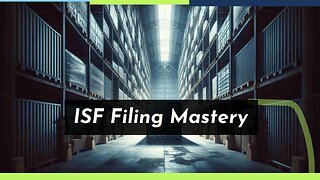Premium Only Content

Protecting Your Imports: The Importance of Data Privacy and Protection in ISF
ISF Depot // 661-246-8217 // [email protected] // www.isfdepot.com
In this video, we explore the importance of data privacy and protection in Importer Security Filing (ISF) and its significance in customs brokerage and trade compliance. ISF is a requirement imposed by the US Customs and Border Protection (CBP) that mandates importers or their authorized agents to provide specific shipment information before goods are loaded onto an ocean vessel bound for the United States. This information helps the CBP assess potential risks and enhance supply chain security. Data privacy involves safeguarding sensitive information shared during ISF, such as details about cargo, parties involved, and their roles in the supply chain. Implementing robust security measures and having strong data privacy policies in place are essential to prevent unauthorized access and misuse. Data protection ensures the integrity, availability, and confidentiality of the ISF data through regular backups, system monitoring, and disaster recovery plans. Customs brokers and agents need to prioritize data privacy and protection to maintain the trust of importers and avoid reputational damage, legal liabilities, and disruptions in international trade. Staying updated with regulations and industry best practices is crucial for effective data handling and risk mitigation.
#usimportbond #isfcustomsbroker #uscustomsclearing #isfentry
Video Disclaimer Here: This tutorial is independent and not affiliated with any US governmental entities.
1:08 ISF data submission involves sharing sensitive cargo information, parties involved, and their roles in the supply chain, such as importer of record, seller, buyer, consignee, and manufacturer.
1:44 Secure electronic systems, encryption, firewalls, and access controls are essential for protecting ISF data privacy.
2:14 Importers and their agents need strong data privacy policies to outline how they handle and protect client information.
2:49 Regular data backup, system monitoring, disaster recovery plans, and compliance with regulations are necessary to prevent data loss and maintain trust with stakeholders.
3:06 Customs brokers and agents should stay updated on regulations and best practices through training to enhance their ability to handle sensitive information and reduce risks.
3:23 Prioritizing data privacy through robust security measures, clear policies, and compliance with regulations is crucial for maintaining trust with importers and securing the global supply chain.
-
 4:50
4:50
ISF Depot
6 days agoUnlocking Success: The Power of Accurate Tariff Codes in ISF Filing
31 -
 1:33:51
1:33:51
Steve-O's Wild Ride! Podcast
1 day ago $1.44 earnedJohn C. Reilly's Surprising Connection To Jackass (And Beef With Weeman!)
38.1K6 -
 DVR
DVR
StoneMountain64
4 hours agoBattlefield 6 News and Extraction Gaming
33.2K -
 2:13:30
2:13:30
Side Scrollers Podcast
7 hours agoUK Introduces MANDATORY Digital ID + Dallas ICE Shooting BLAMED on Gaming + More | Side Scrollers
104K9 -
 1:54:17
1:54:17
The Charlie Kirk Show
6 hours agoCharlie's Last Trip + What's Next + AMA | Erika Kirk, Mikey McCoy | 9.26.2025
294K251 -
 1:02:53
1:02:53
The Quartering
5 hours agoMAGA Kid Kidnapped, Hasan Piker Meltdown, Vivek Fights For Alex Jones & More
138K58 -
 32:49
32:49
Simply Bitcoin
1 day ago $2.06 earnedBitcoin Crucible w/ Alex Stanczyk | EP 1
41.7K1 -
 1:57:37
1:57:37
Tucker Carlson
5 hours agoCharlie Sheen’s Craziest Hollywood Stories and Why He Refuses to Believe the Official Story of 9/11
68.7K65 -
 1:33:12
1:33:12
Sean Unpaved
5 hours agoRyder Cup Tee-Off, CFB's Week 5 Madness, & the NFL's Win-or-Wilt Week 4
34.7K1 -
 2:07:01
2:07:01
The Culture War with Tim Pool
7 hours agoWho Really Killed Charlie Kirk? Truth Behind Kirk Assassination | The Culture War with Tim Pool
250K243